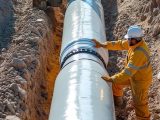
Hydrogen Production: ABB Unveils HyQ PCI880 High-Efficiency Power Converter
October 24, 2025Ever wondered how much juice gets lost when you’re splitting water into hydrogen and oxygen? In the world of green hydrogen, squeezing out every bit of efficiency can make a massive dent in both costs and carbon footprints. With global demand for clean hydrogen booming—thanks to net-zero commitments from Europe to Asia to North America—there’s no wiggle room for waste. That’s exactly where ABB steps in. On October 8, 2025, this Swiss engineering powerhouse unveiled the HyQ PCI880, a modular, high-efficiency power converter built to supercharge large-scale electrolyzer systems.
This isn’t your run-of-the-mill rectifier. The HyQ PCI880 is tailor-made to crush age-old inefficiencies in electrolysis. It transforms grid-fed alternating current into a rock-steady direct current feed—vital for keeping electrolyzers humming along smoothly. ABB boasts up to 98% efficiency, which means only a sliver of power—just 2%—goes up in heat. On top of that, it can pump out a solid 6,400 A DC, slotting neatly into everything from pilot setups to massive industrial hubs. Thanks to its plug-and-play, liquid-cooled modular design, you can scale up on the fly or hot-swap modules without grinding production to a halt.
A Precision Power Supply for Electrolyzers
Under the hood, the HyQ PCI880 leans on insulated-gate bipolar transistors (IGBTs) honed for high-current action. These semiconductor champs use rapid pulse-width modulation to carve an AC waveform into the cleanest DC you’ll find. The payoff? Fewer voltage spikes, less electrical noise and a gentler startup for sensitive electrolyzer membranes. Digital control loops keep tabs on voltage, current and temperature in real time—think of it as the system’s health monitor. If a module starts to overheat or drift off spec, it isolates itself, reroutes power and pings your team through an intuitive HMI or cloud dashboard.
Why Efficiency Matters
Picture filling a bucket with a leak in the bottom. No matter how fast you pour, water keeps slipping away. Conventional converters, often capped at 95% efficiency or less, are those leaky buckets. Every percentage point lost adds up when you’re running megawatts of electrolyzers—meaning bigger electric bills and slimmer margins. Crank efficiency to 98%, like the HyQ PCI880 does, and you nearly halve those losses. Over a year, a 100-MW plant could save hundreds of thousands of dollars. In the high-stakes world of industrial decarbonization, that’s a game-changer.
From Concept to Global Rollout
You didn’t wake up one day and invent the HyQ PCI880 overnight. ABB’s roots stretch back to the 19th century, though the modern incarnation took shape after the 1988 ASEA-BBC tie-up. Since then, ABB has charged high-speed trains, data centers and offshore rigs—fine-tuning power electronics all along the way. Now, with governments rolling out stimulus packages for renewable energy and green-hydrogen projects, the HyQ PCI880 couldn’t be more on point. It ticks all the boxes for grid-code standards—from Europe’s strict harmonics limits to Asia’s voltage tolerances—so you can deploy it worldwide without getting bogged down in recertification red tape. Whether you’re retrofitting a brownfield site or building greenfield from scratch, ABB says it’s ready to plug in.
Ripple Effects Beyond the Factory Floor
Trim energy waste at the front end, and you unlock perks all the way down the chain. Project financiers get cozy when OPEX is predictable. Electrolyzer makers can tout lower running costs, driving orders as the market swells from a handful of gigawatts today to tens of gigawatts by decade’s end. Even grid operators stand to gain. Tight, controllable loads—like the HyQ PCI880—can moonlight as virtual batteries, gulping down excess solar or wind output and dialing back during peak demand. It’s not flashy, but it’s vital for smoothing the notorious “duck curve.”
Looking Beyond the First Wave
Sure, the HyQ PCI880 won’t fix every kink in the hydrogen production chain. You still need ultra-pure water, top-notch gas separation and a high-pressure or liquefied hydrogen network. But by tackling power conversion—the unsung hero of any electrolyzer—you remove a major bottleneck that’s tripped up countless pilots. And the story’s far from over: ABB’s roadmap includes software tweaks for predictive maintenance, remote diagnostics and even AI-driven optimization, so your converters keep getting smarter over time.
Strategic Partnerships and Market Implications
ABB isn’t flying solo. They’re teaming up with leading electrolyzer OEMs and project developers to bundle the HyQ PCI880 into turnkey packages. By aligning power-electronics experts with stack builders and EPC contractors, they aim to slash project timelines and chop installation costs. For investors eyeing green hydrogen ventures, that kind of all-in-one solution can make the difference between a bankable deal and a one-off pilot. Policymakers are paying attention, too—proven tech stacks and solid performance data can grease the wheels on permitting and subsidy schemes.
What Challenges Remain?
Let’s be real: hitting 98% efficiency is huge, but you still need cheap, clean electricity, robust water treatment and a thirsty market for your hydrogen. Electrolyzer stack prices need to slide further, and industry-wide standards for purity and compression must crystalize. On top of that, you’ll need pipelines, storage tanks and refueling stations to catch up if green hydrogen is going to edge out grey or blue. But with power converters like the HyQ PCI880 in play, one critical piece of the puzzle just snapped into place: the power bill.
So, what’s next? Keep an eye on demo plants pairing these converters with offshore wind farms or desert solar arrays—that’s where real-world conditions will put everything from thermal management to grid-sync to the test. If ABB’s HyQ PCI880 lives up to the hype, we could see a quiet yet meaningful shift: fewer headaches over grid compliance, more bankable project models and a smoother path toward a zero-emission energy future.
About the Company
ABB is a global leader in electrification, robotics, automation and motion solutions for utilities, industry, transport and infrastructure. Born from the 1988 merger of ASEA and BBC, ABB has long been at the forefront of power and automation technology, driving innovation in renewable energy and green hydrogen production.



 With over 15 years of reporting hydrogen news, we are your premier source for the latest updates and insights in hydrogen and renewable energy.
With over 15 years of reporting hydrogen news, we are your premier source for the latest updates and insights in hydrogen and renewable energy.